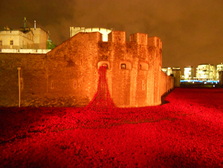
On Tuesday evening, I took the opportunity to visit the Tower of London to see the installation of poppies there. Walking the entire circumference of the site means I saw all 888,246 - one for every British and Commonwealth person killed during World War 1.
Two things struck me.
One is the vast number of people concerned. This great red carpet, like a river of blood, stretches on and on; the poppies, individually, seem countless. Somehow, depicting the dead like this brings the statistics of war to life, giving some notion of the overwhelming scale of the fatalities. It's more real than a mere number.
Secondly, this is not just the dead of Britain, but the dead of the Commonwealth. It's timely to be reminded of that when so much of our current public discourse is on the subject of immigration, frequently tinged by racism or at least nationalism. The poppies remind us that people of different races, cultures and faiths shared the struggles, dangers and discomforts of war together; people of different races, cultures and faiths shared the same risk and reality of death. There is no monopoly of respect and honour on the part of British forces; equal respect and honour are due to those from other parts of the world too. That's just as true today, in our very different circumstances, as it was in the war of a century ago. Let's not forget it.
I'm glad I went. It was sobering and thought-provoking, and the image is one I shall always remember.
Fr Christopher
Two things struck me.
One is the vast number of people concerned. This great red carpet, like a river of blood, stretches on and on; the poppies, individually, seem countless. Somehow, depicting the dead like this brings the statistics of war to life, giving some notion of the overwhelming scale of the fatalities. It's more real than a mere number.
Secondly, this is not just the dead of Britain, but the dead of the Commonwealth. It's timely to be reminded of that when so much of our current public discourse is on the subject of immigration, frequently tinged by racism or at least nationalism. The poppies remind us that people of different races, cultures and faiths shared the struggles, dangers and discomforts of war together; people of different races, cultures and faiths shared the same risk and reality of death. There is no monopoly of respect and honour on the part of British forces; equal respect and honour are due to those from other parts of the world too. That's just as true today, in our very different circumstances, as it was in the war of a century ago. Let's not forget it.
I'm glad I went. It was sobering and thought-provoking, and the image is one I shall always remember.
Fr Christopher

 RSS Feed
RSS Feed